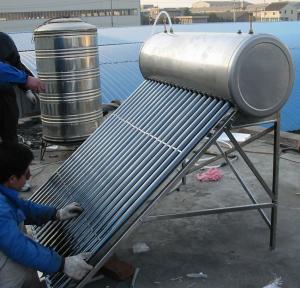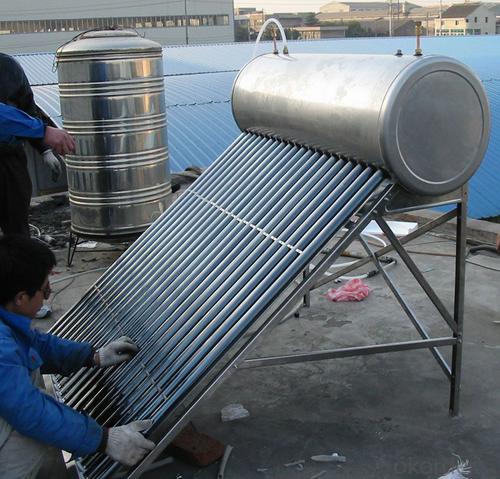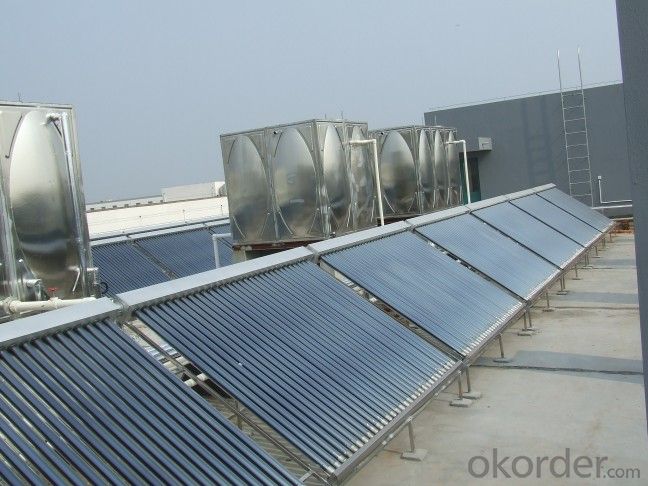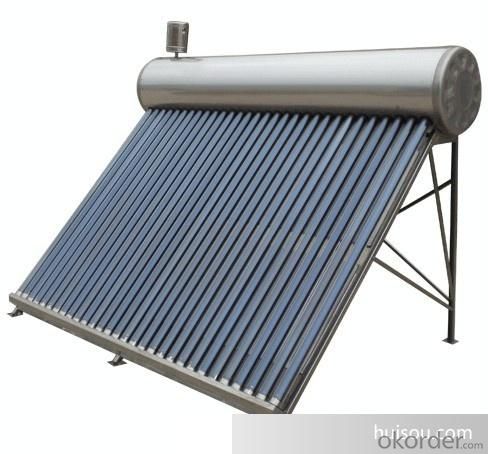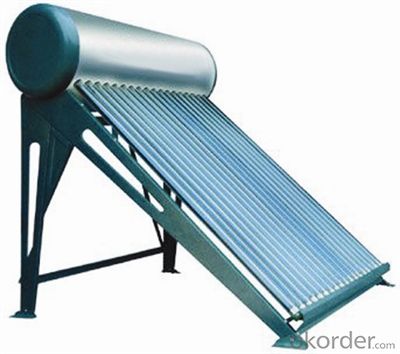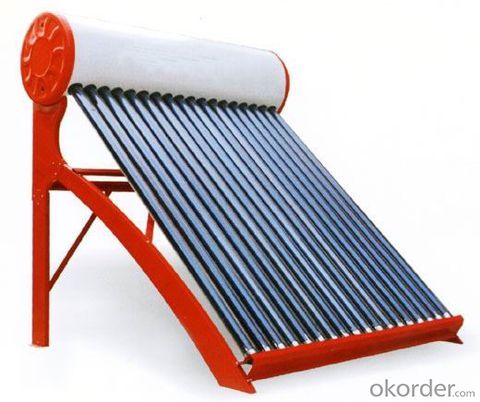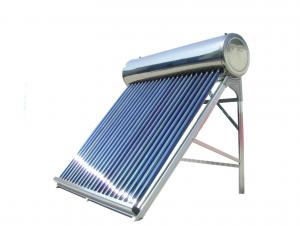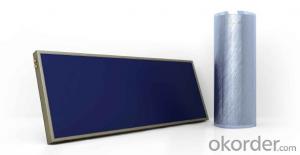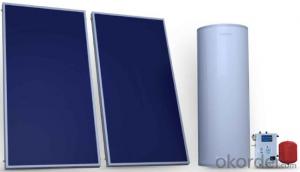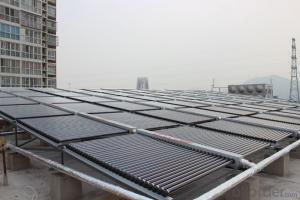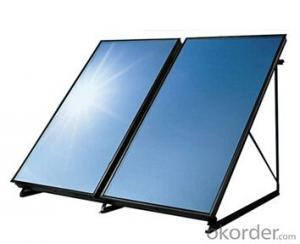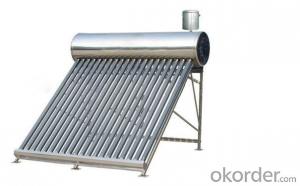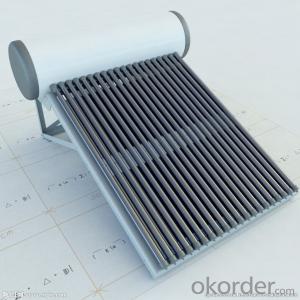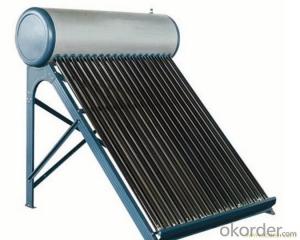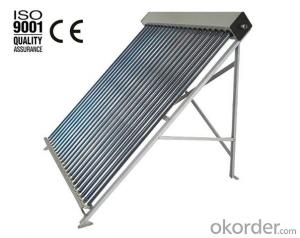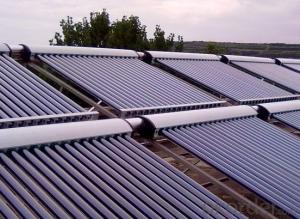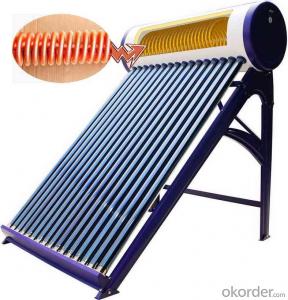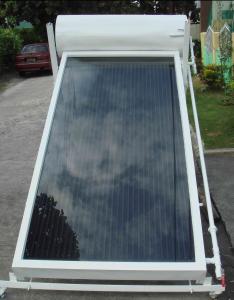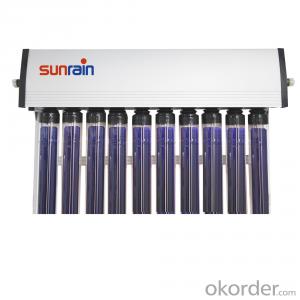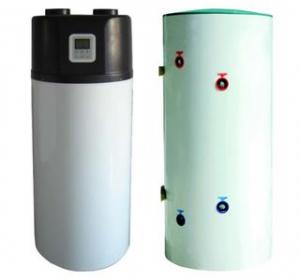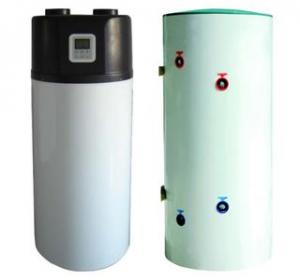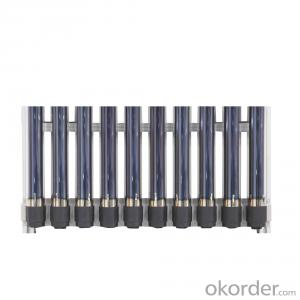Ics Solar Water Heater Vacuum 20 Tube Solar Collector China Top Supplier
- Loading Port:
- China main port
- Payment Terms:
- TT OR LC
- Min Order Qty:
- 10 set
- Supply Capability:
- 10000 set/month
OKorder Service Pledge
OKorder Financial Service
You Might Also Like
Solar water heaters features
1. The upright tank can make the water temperature to a high level. It can hot the water instantly
2. The tank inside the building, the hot water loses less energy than the normal one
3. The solar collector and the tank of solar water heater is separated, that makes the system combine with the building perfectly, which will reduce the sightseeing for the building and environment around
4. Back up with electric heater so that in the day without sunshine hot water can also be used
5. Can be combined with gas or electric heater
6. Max. Pressure: 12bar; Operating Pressure: 6 bar
7. It can be used for other function, such as warming
Solar water heaters working principle
1. The solar collector absorbs solar energy and transmits it to the solar water heater tank through circulation
2. When the temperature of the collector reaches the set value, the controller starts the circulation pump automatically
3. The circulation pump makes heat-conducting liquid circulate automatically
4. The heat-conducting liquid transfers heat to water by lower heat exchanger in the water tank.
5. When the temperature difference between solar collector and heat pipe solar water heaters tank doesn't reach the set value, the circulation pump will be shut automatically
6. In case the temperature of the water tank does not reach Tmax, Electric Heating Element will start to work automatically
Solar water heaters working station component:
1. Operating screen
2. Manometer
3. Pump speed adjust switches
4. Temperature difference circulation pump
5. Flow rate indicator
6. Return circuit connector
7. Safety valve
8. Expansion vessel connector9. Return circuit connector
10. Wall mounting
11. Expansion vessel:8L
12. Pressure resistance: 10 bar pressure for expansion vessel
Solar water heaters specification:
Description | solar water heaters |
Material of out manifold | 0.55mm thickness color steel/ fluorine carbon steel |
Material of inner tank | Food grade 2.0 mm thickness SUS304 stainless steel |
Tank insulating layer | 40mm 45kg/m³ high-density polyurethane foamed |
Inlet and outlet hole | Male G1'' |
Max pressure | 0.6 Mpa |
Solar collector tube | 3.3 Borosilicate glass with N/Al coating |
Thickness of glass tube | 1.6mm |
Vacuum tube tightness | P≤0.005 Pa |
Absorption | as=0.93-0.96 (AM1.5) |
Emission ratio | εh=0.04-0.06 (80C±5C) |
Idle sunning property parameters | Y=220~260m2.C/KW |
Average heat loss coefficient | ULT=0.6~0.7W/(m2.C) |
Bracket: | 2.0mm thickness aluminum alloy |
Tank weight | 75KGS |
Tank size | 560mm Dia x 1810mm Height |
Tank capacity | 300L |
Solar collector | 2pcs 58x1800x15tube solar collector |
Absorber area | 2.811 m² |
Working station | SP116 working station |
Heat exchanger length | Upper:12m, Underside:18m |
Solar water heaters details show:
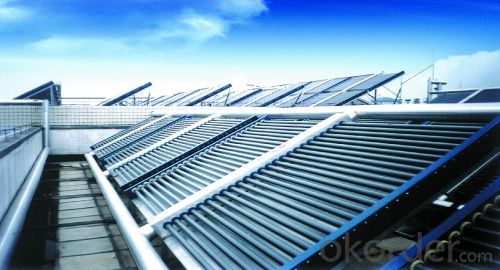
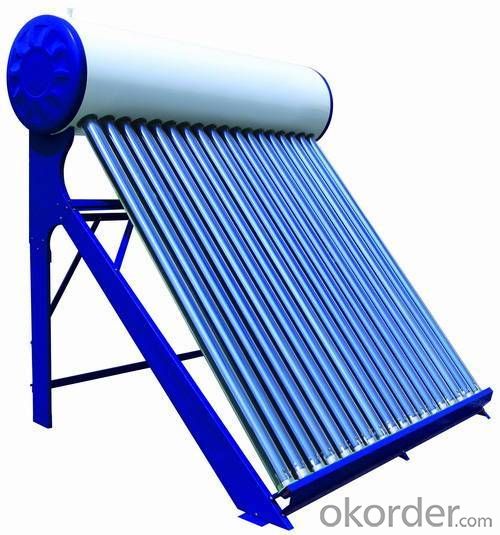
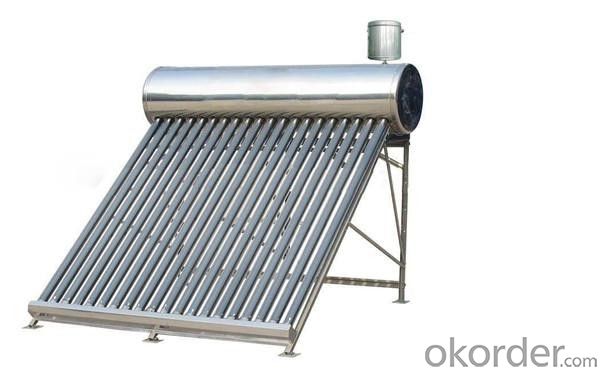
Benefits of this kind of solar water heaters:
1. Prolong the life of your existing water heater
2.Costs less than an electric, gas or oil water heater
3.No maintenance required
4.Lasts longer than a traditional hot water heater
5.Reduce your water heating costs
- Q: How long does it take to heat water with a solar water heater?
- The time it takes to heat water with a solar water heater can vary depending on various factors such as the size and efficiency of the system, the amount of sunlight available, and the initial temperature of the water. However, on average, it usually takes a few hours to heat water to a desired temperature using a solar water heater.
- Q: Solar water heater installed under the probe at the leak, the new probe or water leakage, how the problem ah? How to solve?
- If you have other vents in the tank, it will be blocked and the sensors will be placed elsewhereSpecific need to solve the scene
- Q: How does the type of glazing material impact the performance of a solar water heater?
- The type of glazing material used in a solar water heater directly affects its performance. A high-quality glazing material, such as low-iron glass or polycarbonate, allows maximum solar radiation to pass through while minimizing heat loss. This results in improved efficiency and higher water temperature. On the other hand, using a poor glazing material with high thermal conductivity or low transmittance can lead to significant heat losses and reduced overall performance of the solar water heater. Therefore, the choice of glazing material is crucial in optimizing the performance and effectiveness of a solar water heater.
- Q: Can a solar water heater be used in areas with low water pressure?
- In areas with low water pressure, a solar water heater can indeed be utilized. Unlike relying solely on water pressure, solar water heaters usually depend on gravity or natural convection to circulate the water. They are specifically engineered to operate effectively even under low water pressure, thus making them well-suited for regions where water pressure is not high. Nevertheless, it is vital to ensure that the solar water heater system is appropriately sized and designed to match the specific water pressure conditions, in order to attain the best possible performance.
- Q: How does the size of the storage tank affect the performance of a solar water heater?
- The size of the storage tank directly affects the performance of a solar water heater. A larger storage tank allows for more hot water to be stored, resulting in a longer duration of hot water availability. This is particularly beneficial during periods of low solar radiation or increased hot water demand. On the other hand, a smaller storage tank may lead to insufficient hot water supply, especially in situations where the solar energy input is limited. Therefore, the size of the storage tank plays a crucial role in determining the overall effectiveness and performance of a solar water heater.
- Q: Can a solar water heater be used in areas with limited access to wood?
- Yes, a solar water heater can be used in areas with limited access to wood. Solar water heaters rely on the sun's energy to heat water, eliminating the need for wood or any other fuel source. As long as there is sufficient sunlight, a solar water heater can efficiently provide hot water without relying on wood or any other traditional fuel sources.
- Q: What is the average cost of maintenance for a solar water heater?
- The average cost of maintenance for a solar water heater can vary depending on various factors such as the type of system, its age, and the specific maintenance requirements. However, on average, homeowners can expect to spend around $100 to $300 per year on maintenance for a solar water heater. This includes routine inspections, cleaning, and occasional repairs or replacements of components such as pumps or valves. It is important to note that proper maintenance is crucial for maximizing the system's efficiency and lifespan.
- Q: How does a solar water heater impact water heater temperature consistency?
- A solar water heater can positively impact water heater temperature consistency. It utilizes the sun's energy to heat water, providing a continuous and reliable source of heat. This reduces fluctuations in water temperature, ensuring a more consistent and steady supply of hot water.
- Q: Can a solar water heater be used in areas with strict building codes?
- Yes, a solar water heater can be used in areas with strict building codes. However, it would be important to ensure that the solar water heater system meets all the necessary requirements and regulations outlined by the local building codes. This may involve obtaining proper permits, following specific installation guidelines, and adhering to safety standards. Consulting with local authorities or a professional installer experienced in navigating building codes would be advisable in order to ensure compliance and successful installation.
- Q: Can a solar water heater be installed in a mobile home?
- Yes, a solar water heater can be installed in a mobile home. The installation process may vary depending on the specific design and structure of the mobile home, but with the right equipment and professional assistance, it is definitely possible to harness solar energy to heat water in a mobile home.
Send your message to us
Ics Solar Water Heater Vacuum 20 Tube Solar Collector China Top Supplier
- Loading Port:
- China main port
- Payment Terms:
- TT OR LC
- Min Order Qty:
- 10 set
- Supply Capability:
- 10000 set/month
OKorder Service Pledge
OKorder Financial Service
Similar products
Hot products
Hot Searches
Related keywords
